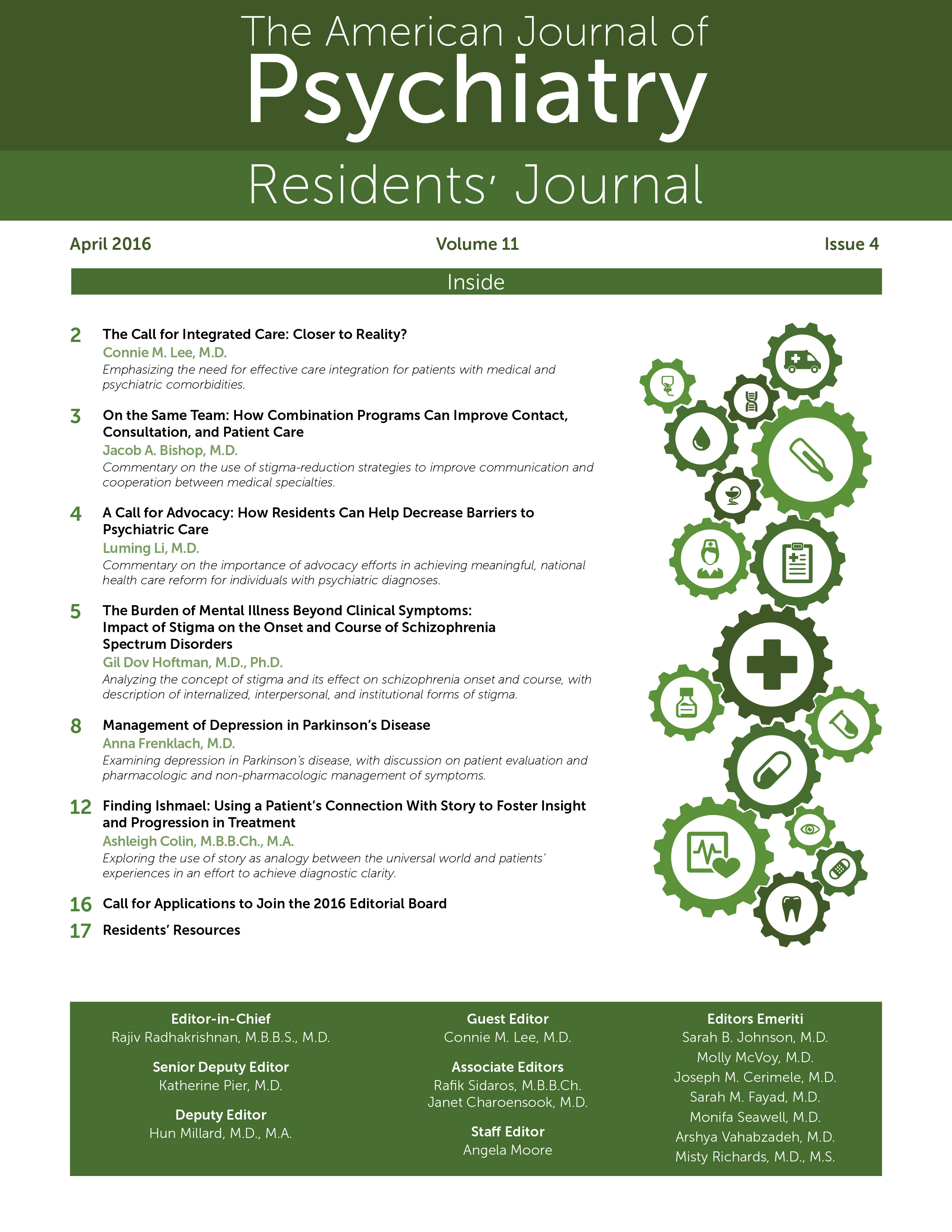Management of Depression in Parkinson’s Disease
[Case]
Parkinson’s Disease and Depression
Evaluation of Depression in Parkinson’s Disease
| Evaluation |
| • Comprehensive medical and psychiatric history. |
| • Review of current medications. |
| • Physical examination. |
| • Collateral information. |
| • Laboratory testing to rule out medical etiologies. |
| • Head imaging, neurology consultation, and neuropsychological testing as clinically indicated. |
| Diagnosis |
| • DSM-IV diagnostic criteria for major depression and dysthymic disorder have been validated for use in this patient population (7). |
| Pharmacologic treatment |
| • No clear consensus regarding antidepressants for the treatment of depression in Parkinson’s disease exists at this time. |
| • There is some evidence to support the use of selective serotonin reuptake inhibitors (SSRIs), serotonin norepinephrine reuptake inhibitors (SNRIs), monoamine oxidase type B inhibitors (MAOBIs), tricyclic antidepressants, and dopamine agonists (9–13). |
| • SSRIs remain the most commonly prescribed antidepressants given their more favorable side-effect profile; however, the strength of evidence for the efficacy of antidepressants in treating depression in Parkinson’s disease is controversial (1, 4, 8). |
| • MAOBIs and tricyclic antidepressants may be used cautiously for patients who have not responded to treatment with SSRIs and/or SNRIs (12, 15). |
| Non-pharmacologic treatment |
| • There is insufficient evidence to support the efficacy of either ECT or transcranial magnetic stimulation; however, these treatments may be considered in severe, refractory cases that have failed pharmacotherapy (16). |
| • Psychotherapy, particularly cognitive-behavioral therapy, is increasingly being studied with promising results (10). |
Management of Depression in Parkinson’s Disease
Pharmacologic Management
| Medication Class | Dose Range (mg/day) | Side Effects for Medication Class | Contraindications for Medication Class |
|---|---|---|---|
| Selective serotonin reuptake inhibitors | Fluoxetine: 10–60 mg/day; Citalopram: 10–40 mg/day; (10–20 mg/day in poor CYP2C19 metabolizers and patients older than 60 years old.); Sertraline 25–200 mg/day; Paroxetine 10–50 mg/day | Common: Gastrointestinal side effectsa, sexual dysfunction, insomnia; Rare/serious: Induction of mania, activation of suicidal ideation | Caution with other serotonergic agents due to risk of serotonin syndrome |
| Serotonin norepinephrine reuptake inhibitors | Venlafaxine: 37.5–225 mg/day; Duloxetine: 20–120 mg/day | Common: Gastrointestinal side effectsa, sexual dysfunction, insomnia, dose-dependent increased blood pressure; Rare/serious: Induction of mania, activation of suicidal ideation | Caution with other serotonergic agents due to risk of serotonin syndrome |
| Monoamine oxidase type B inhibitors | Rasagiline: 1–2 mg/day; (hepatic dosing: 0.5 mg/day for mild impairment; avoid use in moderate-severe impairment) | Common: Nausea, headache, orthostatic hypotension, dyskinesia; Rare/serious: Hypertensive crisis, impulse control disorders, paranoia, hallucinations, confusion, sudden sleep episodes, increased risk of melanoma | Caution with other serotonergic agents due to risk of serotonin syndrome; Caution with rapid dose reduction or discontinuation due to risk of neuroleptic malignant syndrome-like reactions; Contraindicated with concomitant use of other MAOIs (including selective MAOBIs), meperidine, methadone, propoxyphene, or tramadol within 14 days of rasagiline or concomitant use with cyclobenzaprine, dextromethorphan, or St. John’s wort |
| Tricyclic antidepressants | Amitriptyline: 25–300 mg/day; Desipramine: 25–200 mg/day; Nortriptyline: 25–150 mg/day | Common: Anticholinergic side effectsb, weight gain, dizziness, orthostatic hypotension, sexual dysfunction; Rare/serious: QTc prolongation, cardiac arrhythmias, sudden death, induction of mania | Caution with other serotonergic agents due to risk of serotonin syndrome; Contraindicated in the acute recovery phase following a myocardial infarction, in patients with a history of QTc prolongation or cardiac arrhythmia, or uncompensated heart failure |
| Other | Mirtazapine: 7.5–45 mg/day | Common: Sedation, increased appetite, weight gain, elevated cholesterol; Rare/serious: Induction of mania, activation of suicidal ideation | Caution with other serotonergic agents due to risk of serotonin syndrome |
| Bupropion: 100–450 mg/day | Common: Nausea, weight loss, anxiety, agitation, insomnia; Rare/serious: Seizure, induction of mania, activation of suicidal ideation | Contraindicated in patients with a history of seizures, anorexia, bulimia, or undergoing abrupt discontinuation of ethanol or sedatives | |
| Dopamine agonists | Pramipexole: 1–3 mg/day | Common: Nausea, dyskinesia; Rare/serious: Impulse control disorders, paranoia, hallucinations, confusion | Caution if renal impairment |
Non-Pharmacologic Management
Conclusions
Key Points/Clinical Pearls
References
Information & Authors
Information
Published In
History
Authors
Metrics & Citations
Metrics
Citations
Export Citations
If you have the appropriate software installed, you can download article citation data to the citation manager of your choice. Simply select your manager software from the list below and click Download.
For more information or tips please see 'Downloading to a citation manager' in the Help menu.
View Options
View options
PDF/EPUB
View PDF/EPUBGet Access
Login options
Already a subscriber? Access your subscription through your login credentials or your institution for full access to this article.
Personal login Institutional Login Open Athens loginNot a subscriber?
PsychiatryOnline subscription options offer access to the DSM-5-TR® library, books, journals, CME, and patient resources. This all-in-one virtual library provides psychiatrists and mental health professionals with key resources for diagnosis, treatment, research, and professional development.
Need more help? PsychiatryOnline Customer Service may be reached by emailing [email protected] or by calling 800-368-5777 (in the U.S.) or 703-907-7322 (outside the U.S.).
